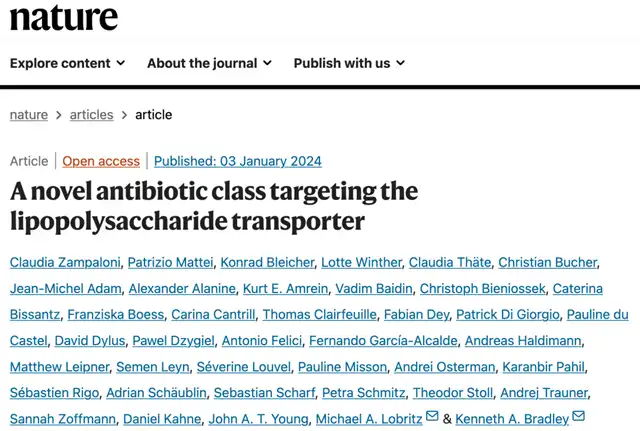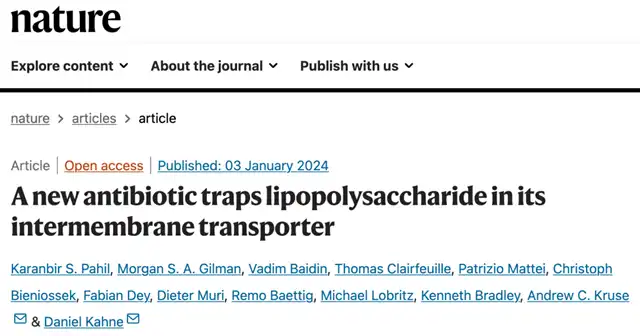New Antibiotic Shows Promise Against Super Drug-Resistant Bacteria
- Normal Liver Cells Found to Promote Cancer Metastasis to the Liver
- Nearly 80% Complete Remission: Breakthrough in ADC Anti-Tumor Treatment
- Vaccination Against Common Diseases May Prevent Dementia!
- New Alzheimer’s Disease (AD) Diagnosis and Staging Criteria
- Breakthrough in Alzheimer’s Disease: New Nasal Spray Halts Cognitive Decline by Targeting Toxic Protein
- Can the Tap Water at the Paris Olympics be Drunk Directly?
New Antibiotic Shows Promise Against Super Drug-Resistant Bacteria, Enters Human Clinical Trials
- Should China be held legally responsible for the US’s $18 trillion COVID losses?
- CT Radiation Exposure Linked to Blood Cancer in Children and Adolescents
- FDA has mandated a top-level black box warning for all marketed CAR-T therapies
- Can people with high blood pressure eat peanuts?
- What is the difference between dopamine and dobutamine?
- How long can the patient live after heart stent surgery?
New Antibiotic Shows Promise Against Super Drug-Resistant Bacteria, Enters Human Clinical Trials
Various microorganisms inhabit the natural world, many of which play crucial roles in our health, such as the gut microbiota. However, there are also pathogenic bacteria that pose serious threats to health, such as Mycobacterium tuberculosis (causing tuberculosis) and Vibrio cholerae (causing cholera). Throughout human history, combating these pathogenic bacteria has been a formidable challenge, relying mostly on the body’s immune system.
It wasn’t until 1928 when British bacteriologist Alexander Fleming discovered the world’s first antibiotic, penicillin, providing humanity with a potent weapon against pathogenic bacteria. Starting in 1942, penicillin’s mass production and use saved countless lives, becoming a major contributor to increased life expectancy.
However, the widespread use of antibiotics led to a significant crisis—antibiotic resistance (AMR). Antibiotic resistance has emerged as an urgent global public health threat in recent decades, with carbapenem-resistant Acinetobacter baumannii (CRAB) being particularly concerning. CRAB is classified as a Priority 1 pathogen by the World Health Organization and identified as an urgent threat by the U.S. Centers for Disease Control and Prevention.
A. baumannii is a Gram-negative bacterium with an outer membrane containing lipopolysaccharides (LPS), providing resistance to various antibiotics, making it challenging to eradicate. Inhibiting LPS synthesis and its transport to the outer membrane can reduce cell viability and increase sensitivity to certain antibiotics.
On January 3, 2024, researchers from Roche Pharmaceuticals and Harvard University published two papers in the journal Nature, reporting the discovery and development of a novel antibiotic as a clinical candidate. This new antibiotic, named zosurabalpin, belongs to the class of tethered macrocyclic peptides and has shown efficacy against the super drug-resistant bacterium CRAB.
Carbapenem-resistant Acinetobacter baumannii has become a major global pathogen with limited treatment options. For over 50 years, no new antibiotic chemical types with antibacterial activity against A. baumannii have been introduced. In the first Nature paper, the research team identified and optimized tethered macrocyclic peptide antibiotics with potent antibacterial activity against CRAB.

The mechanism of action of these molecules involves blocking the protein complex LptB2FGC, used by Gram-negative bacteria for transporting outer membrane lipopolysaccharides. The clinical candidate zosurabalpin (RG6006), derived from tethered macrocyclic peptides, effectively treated highly drug-resistant CRAB isolates in vitro and in mouse infection models, bypassing their resistance mechanisms to existing antibiotics.
This antibiotic represents a promising treatment modality for CRAB invasive infection patients with limited current therapeutic options, further confirming LptB2FGC as a viable target for antibiotic development.
Gram-negative bacteria are challenging to kill because their cytoplasmic membrane is surrounded by an outer membrane that blocks most antibiotics’ entry. The impermeability of the outer membrane is due to the presence of a large amphipathic glycolipid—lipopolysaccharide (LPS). Assembling the outer membrane requires transporting LPS through a protein bridge from the cytoplasmic membrane to the cell surface. Maintaining the integrity of the outer membrane is crucial for bacterial cell survival, and its disruption may increase sensitivity to certain antibiotics.
Hence, efforts have long been underway to find inhibitors of seven lipopolysaccharide transport (Lpt) proteins responsible for this transmembrane transport. Recently, a new class of antibiotics targeting the LPS transport mechanism in A. baumannii was discovered.
In the second Nature paper, the research team investigated the mechanism of action of these antibiotics, demonstrating that they capture the substrate-bound state of the LPS transport complex, making it difficult to transport LPS and ultimately leading to cell death.

In this study, the researchers used structural, biochemical, and genetic methods to show that these antibiotics captured the substrate-binding conformation of the LPS transport protein, rendering the LPS transport mechanism ineffective. These inhibitors achieve this by recognizing the composite binding site formed by the Lpt transport complex and its LPS substrate. This study identified an unconventional inhibition mechanism for LPS transport, revealing a druggable conformation of the Lpt transport complex and laying the foundation for extending this class of antibiotics to other Gram-negative pathogens.
In summary, these two studies indicate that the new compound zosurabalpin shows promise in addressing highly drug-resistant CRAB. Human clinical trials are currently underway to further develop the clinical applications of this compound. The research also identifies a specific conformation of the LPS transport complex as a druggable target for developing similar compounds targeting other Gram-negative bacteria.
New Antibiotic Shows Promise Against Super Drug-Resistant Bacteria, Enters Human Clinical Trials
References:
1. https://www.nature.com/articles/s41586-023-06873-0
2. https://www.nature.com/articles/s41586-023-06799-7
(source:internet, reference only)
Disclaimer of medicaltrend.org
Important Note: The information provided is for informational purposes only and should not be considered as medical advice.



